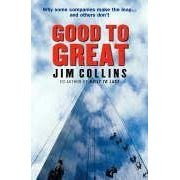 In his book ‘Good to Great’, Jim Collins refers to the two key qualities of Level 5 Leaders of being a paradox. The two qualities he defines are ‘personal humility’ and ‘professional will’.
In his book ‘Good to Great’, Jim Collins refers to the two key qualities of Level 5 Leaders of being a paradox. The two qualities he defines are ‘personal humility’ and ‘professional will’.Throughout our careers we make progress by delivering performance and outcomes that are usually better than our peers or when an opportunity arises that we are considered best to meet or deliver.
It is no surprise then that as we progress through our careers that our ego gets continually fed with the ‘good news’. With some people the more positive feedback they get the more the ego grows and so on in an upward spiral. Such is the power of ego that for some nothing would seem capable of giving a knock back and which for others the same happening could be a humbling experience.
The news is full of examples of those who by dint of their ability, and not inconsiderable hard work, become leaders. In this sense leadership is not a hierarchical thing but unconsciously exercised by being an example that others wish to follow. When these ‘leaders’ fall from grace, as so many do, it is tough for them and everyone else, to handle. This is where the ego has won.
So those that rise to the top of their businesses or societies with significant positions of authority over others have to avoid this ego breakdown. This is where humility comes in. The greater our humility and our humanity, the better there is a chance of us being a Level 5 Leader.
Perhaps a conversation with your Dale Carnegie Consultant will lead you to a place where ego does not matter. In this place our Executive Leadership Programme will accelerate your career to being a Level 5 Leader.
Thanks Jim, for the inspiration.
David Pickering
Sales Consultant and Trainer



